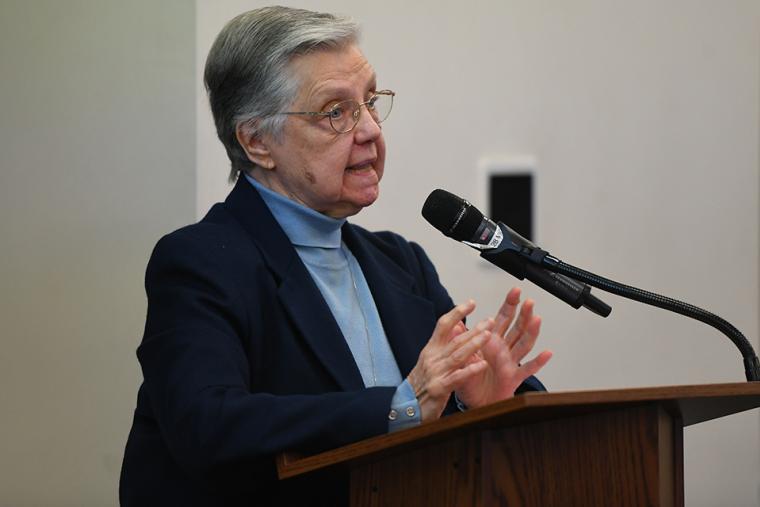A great collaborator with St. Vincent de Paul, St. Louise de Marillac contributed immeasurably to the concept of a Vincentian education throughout her life. Each instilled in their followers the notion that an education is essential to break the cycle of poverty. Those ideas were outlined in a lecture, “St. Louise de Marillac: A Holistic Educator,” given by Sr. Louise Sullivan, D.C., on March 14 in the D’Angelo Center on the Queens, NY, campus.

Sr. Sullivan is a Daughter of Charity of the Province of St. Louise: USA, and Professor Emerita of French at Niagara University. She is the editor and translator from French to English of Saint Louise de Marillac: Spiritual Writings, among other books and articles, and has presented worldwide on St. Louise and other Vincentian themes. Her discussion was sponsored by the Vincentian Center for Church and Society.
St. Vincent de Paul founded the Congregation of the Mission (also known as the Vincentians) to bring people out of poverty. “An education,” Sr. Sullivan observed, “seems secondary to the mission. And yet, we have to remember that Vincent and Louise were both teachers.”
St. Louise was extremely well-educated during a time when few women received a classical education, Sr. Sullivan noted. She was born out of wedlock, and while her mother’s identity is unknown, her father, Louis de Marillac, was a member of a prominent French family.
Placed in the royal Monastery of Poissy and educated by the Dominican Sisters, St. Louise learned art, music, and literature, but was removed by her family upon the death of her father when she was 12. From there, she was placed in a boardinghouse, where she learned the more practical aspects of life.
Eventually married and with a child, St. Louise met St. Vincent de Paul. “His experience was very different from hers, but the combination of these two unlikely collaborators produced what we know as Vincentian education, Vincentian health care, and Vincentian service to anyone and everyone who was in need,” Sr. Sullivan said.
St. Vincent was instrumental in bringing St. Louise’s full potential to life, according to Sr. Sullivan. In 1629, he gave St. Louise her first major challenge: to visit Confraternities of Charity, groups of ladies involved in the care of the sick in their home.
“She possessed the ability to see what was around her and assess what was needed. Before you can ask the essential Vincentian question, ‘What must be done?’ you must first see what the need is.”
While health care would become an essential part of the Vincentian mission, St. Louise saw another need, Sr. Sullivan noted. “She discovered girls who could neither read nor write. Illiteracy was rampant.” St. Louise wanted to educate these girls, not only to read and write, but to provide them with some essential trade, such as sewing or lace making.
As St. Louise founded schools throughout France, another priority surfaced: the education of foundlings, who were children, like herself, born out of wedlock. “They were definitely thought of as throwaway children,” Sr. Sullivan observed. “As their mothers were condemned, so too, were they condemned.”
St. Louise wanted to provide these children with the best education possible. At that time, the Ursuline Sisters were known for their excellence in teaching, so St. Louise asked them to train the Daughters of Charity. St. Vincent helped raise the funds to build the schools.
St. Louise explained that the refrain to serve both spiritually and corporally was explicit in the early writings of Vincent. “This meant serving the whole person,” Sr. Sullivan stressed. “We are talking about the intellectual needs, the spiritual needs, the psychological needs, and the material and physical needs.”
“So what we have is a vision of mission, of education, as an integral, essential part of the Vincentian mission. It came from Vincent, and his faith and experience, and from Louise, and her faith and experience. Neither of them could have done it alone.”
“I have such a love for the Daughters of Charity,” said Jordan Bouchard, Campus Minister, Office of Campus Ministry. “Their stories and their ministry energize me as a woman of faith. I have always been fascinated by St. Louise and how strong she was in her convictions. We should all aspire to be like her.”
The Feast Day of St. Louise de Marillac is May 9, which coincides with the anniversary of her beatification.
Source: St. John’s University News







0 Comments